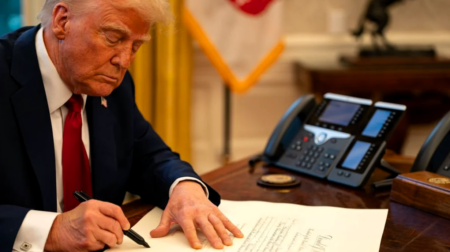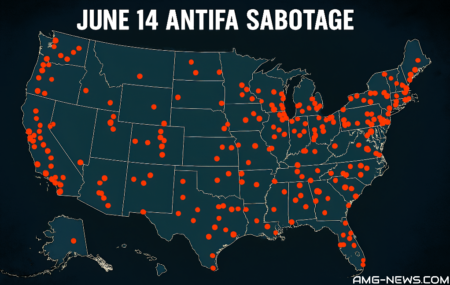All it took for an off-duty police officer to pull a gun on Jose Arreola was a $1.19 pack of Mentos.
According to security footage of the encounter at a convenience store in Buena Park, California, Arreola went into the store on March 16, asked how much the mints were, and began paying for them. As he was getting his change back, he put the mints in his pocket.
An off-duty cop, who has yet to be identified, stepped in. “Hey, give that back. I’m a police officer,” he said, brandishing his gun.
Arreola, clearly startled, repeatedly said, “I paid for that.”
 After a brief back-and-forth, the officer told the cashier, “He tried stealing that from you.”The cashier then confirmed three times that Arreola actually paid for the mints. The officer began a mea culpa: “My apologies, sir. My apologies.” Arreola took his candy and left.
After a brief back-and-forth, the officer told the cashier, “He tried stealing that from you.”The cashier then confirmed three times that Arreola actually paid for the mints. The officer began a mea culpa: “My apologies, sir. My apologies.” Arreola took his candy and left.
“The hardest thing for me was, believe it or not, it wasn’t really the gun,” Arreola told a local CBS affiliate. “It was his arrogance, his way of talking to me. … He treated me like a piece of trash.”
The incident has drawn widespread attention following a report by Tony Saavedra for the Orange County Register.
As Daniel Politi noted at Slate, the video “appears to illustrate how police officers can overreact to what they perceive as tiny slights and often have a hard time accepting when they’re wrong.” It also shows how even minor transgressions can escalate into potentially deadly encounters.
Arreola told a local NBC affiliate that he believes he was racially profiled.
The Buena Park Police Department is investigating the incident.
“I want you to know that after I watched the video I found it to be disturbing, as I’m sure it was to you,”
Buena Park Police Chief Corey Sianez said in a statement.
“However, because there is an ongoing personnel investigation and potential litigation pending against the city, I am unable to discuss the details of our investigation.”
These kinds of incidents are serious, not just because they can get victims carelessly killed but also because they can foster even more distrust in the police. That distrust, in turn, can lead to more violence within a community.
Videos of police doing bad things foster more distrust — and perhaps crime
There’s a longstanding criminological concept at play: “legal cynicism.” The idea is that the government will have a much harder time enforcing the law when large segments of the population don’t trust the government, the police, or the laws.
This is a major explanation for why predominantly minority communities tend to have more crime than other communities: After centuries of neglect and abuse, black and brown Americans are simply much less likely to turn to police for help — and that may lead a small but significant segment of these communities to resort to its own means, including violence, to solve interpersonal conflicts.
There’s research to back this up. A 2016 study from sociologists Matthew Desmond of Harvard, Andrew Papachristos of Yale, and David Kirk of Oxford looked at 911 calls in Milwaukee after incidents of police brutality hit the news.
“This is what folks who rail against the focus on police violence — and pull up against that, community violence — get wrong,” David Kennedy, a criminologist at John Jay College, previously told me.
“What those folks simply don’t understand is that when communities don’t trust the police and are afraid of the police, then they will not and cannot work with police and within the law around issues in their own community. And then those issues within the community become issues the community needs to deal with on their own — and that leads to violence.”
Cases like Arreola’s help feed into the distrust — by signaling to minority communities that police aren’t there to protect them but are instead likely to harass them and use excessive force. In that way, these cases make it a lot harder for police to achieve the basic roles they’re meant to fulfill.
https://www.facebook.com/patricia23irons/videos/1698956240181446/UzpfSTE3MDUxNDQwNTYzOTI2ODY6MjA4NzUxOTA1ODE1NTE4Mg/





![BOMBSHELL: PIZZAGATE EXPOSED — ELITE PEDOPHILE NETWORK TIED TO CLINTON, OBAMA, PODESTA & COMET PING PONG [VIDEO]](https://amg-news.com/wp-content/uploads/2022/03/amg-news-2-1-450x272.jpg)
![BREAKING REPORT! HOLLYWOOD’S BLOODLINE OF EVIL: TOM HANKS’ DAUGHTER EXPOSES GENERATIONS OF RAPE, SACRIFICE, AND OCCULT TORTURE [VIDEO]](https://amg-news.com/wp-content/uploads/2025/06/Tom-Hanks-child-sacrifice-450x264.png)




1 Comment
It would be great if the Truth Social would actually pan out.